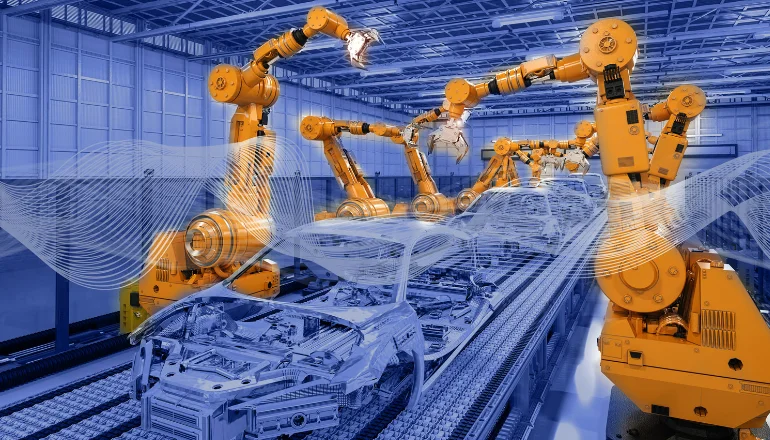Fabless is Fabulous: What do Fabless Automakers Mean for the Future of Traditional OEMs?
March 11, 2021
Idan Nadav
Co-founder

The automotive industry is the latest in a long line of industries starting to explore decoupling engineering from production. The new OEMs on the scene are bringing a fresh perspective in response to advances in technology and changing customer expectations and demands. Following the path of the silicon technology companies, they have gone “fabless.” These new automakers bring the ingenuity, ideas and design, but they outsource the fabrication to skilled manufacturers.
Fabless manufacturing refers to a company that designs and sells hardware devices (i.e. microchips or domain controllers), but outsources the production. In the automotive sector, a fabless automaker is one that engineers the network, and/or software, and/or compute platforms, but does not build the car itself.
This change means that traditional OEMs will find themselves increasingly competing with carmakers that are developing the technology needed to continuously innovate cars and meet dynamic consumer desires head on. If traditional OEMs want to keep pace with the paradigm shift the automotive industry is facing, they need to evolve - and quickly. They must amp up and acquire the software development and management capabilities crucial to delivering the next generation of software-defined and service-oriented vehicles.
Fabless in Action
Two recently announced partnerships serve as evidence of the way newer fabless car manufacturers are operating. Electric vehicle automakers Fisker and Byton have each partnered with Foxconn, the world’s largest electronics manufacturer.
To both these partnerships, Foxconn brings the advanced manufacturing expertise that neither Fisker nor Byton have had the time to develop. As Young-way Liu, Chairman of Foxconn, said about the partnership with Fisker, “The collaboration between our firms means that it will only take 24 months to produce the next Fisker vehicle – from research and development to production, reducing half of the traditional time required to bring a new vehicle to market.”
Instead of adopting the traditional approach of designing and manufacturing cars from start to finish themselves, newer automakers are sticking with their expertise in the software-design/innovation arena and adopting the more business- savvy approach of outsourcing production.
In addition to partnerships like the above, Foxconn created MIH, an open platform alliance to accelerate the development of electric vehicles. The alliance was built in order to ease physical manufacturing logistics and challenges faced by up and coming electric vehicle automakers, empowering those automakers to focus on the automotive technology required, under the hood. The new fabless OEMs are software powerhouses with the ability to respond to the consumer demand for software-defined vehicles, but they recognize their lack of expertise when it comes to production. With each partner focusing on its own zone of genius, the entire process gets a massive efficiency upgrade.
The Origins of Fabless Manufacturing
When the silicon market ramped up in the 1970’s, the major players were all one-stop shops. As integrated device manufacturers (IDMs), they would design, test, manufacture and market their own chips. As the industry evolved in the 1980’s, so did the companies and there was a move towards fabless manufacturing. Many silicon companies switched their focus to design and sales, while outsourcing the fabrication to specialized manufacturers in Taiwan and other places.
This switch led to tremendous growth and efficiency in the industry as a whole. The silicon-manufacturing process has high barriers to entry, especially for smaller startups who may not have the excess capital needed. By focusing only on the design element, more companies could enter the market and rely on the extra production capacity of IDMs to do the fabrication.
Companies like Qualcomm, Broadcom, AMD, and Nvidia, who have long been leaders in the silicon industry, are all fabless because they recognized the need to decouple design from production in order to increase efficiency and remain at the top of the game.
The Accelerated Move to Fabless in the Automotive Industry
The paradigm shift taking place in the automotive industry is being driven by changing consumer demands for a more immersive and personalized driving experience. The vehicles that need to be produced to meet these demands rely heavily on complex software. According to a recent McKinsey report, all of the recent disruptions to the automotive industry have been software-related, and the automakers that don’t have software capabilities may face production delays and difficulty keeping up with software-focused competitors.
Historically, OEMs have focused on hardware and treated software as a secondary priority. While this made sense for many years, recent changes have brought software to the forefront. While some OEMs are trying to increase their in-house software talent, this is a long and challenging process especially as top software engineers are more likely to look for opportunities at newer high-tech firms than at more traditional automakers.
Traditional OEMs are being challenged by up and coming automakers who have realized that being fabless means being able to focus on design and features and achieving a faster turnaround with outsourced production. The next generation of software engineers are only too happy to join these companies where they can freely use opensource technology and build systems that can easily integrate with each other without worrying about the manufacturing details.
When it comes to technology, changes happen fast. The automotive industry has built its strength on its solid reliability, which sometimes translates to being slower to adapt to change. Now is the time to face that challenge head on and explore areas in which to prioritize change.
Is There No Future for the Traditional OEM?
While traditional OEMs do need to embrace change, it’s not all bad news for them. It’s not in their nature to change overnight, nor do they need to. They have the option to partner with the Cybertech Tier to gain immediate access to the knowledge and expertise needed to build the software-driven cars for today’s drivers. OEMs should not give up on the experience they’ve gained and the processes they’ve optimized over the last 100 years. Instead, they can reinvent themselves into a new breed of automaker by combining their skills with those of the Cybertech Tier thus giving the fabless automakers a true run for their money.




